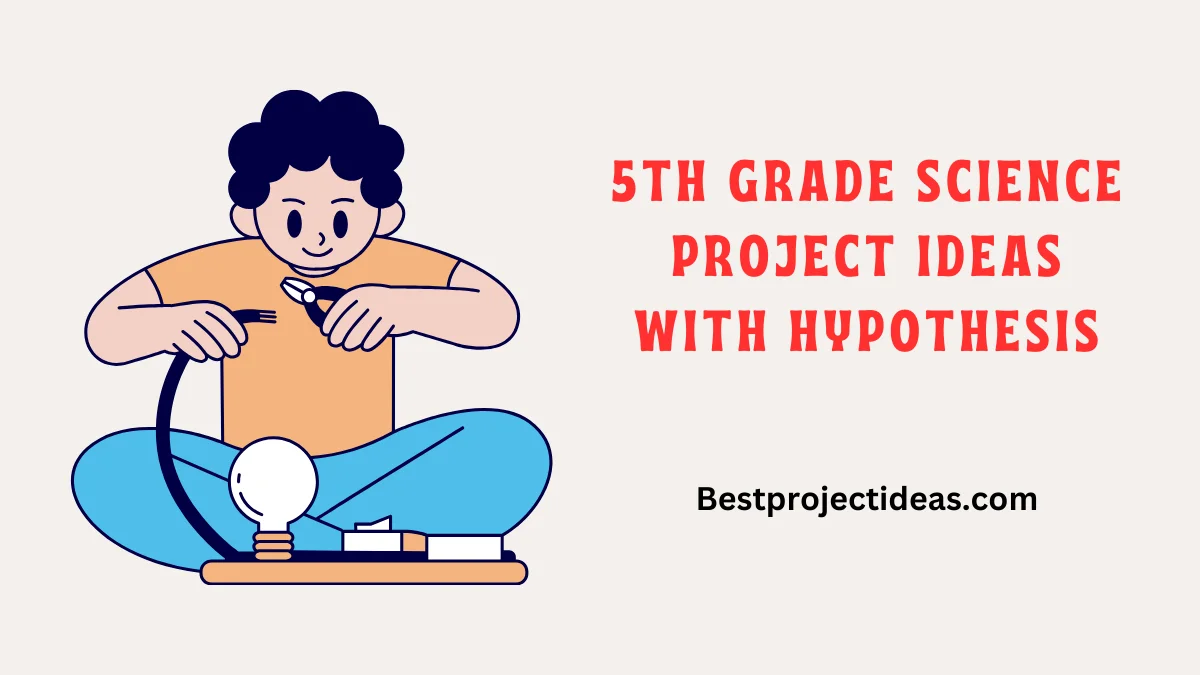
Get ready for fun science adventures! Here are 5th Grade Science Project Ideas With Hypotheses. These experiments will turn you into a mini-scientist at home or school.
You’ll ask big questions and find answers through excellent tests. You might grow strange plants or see how objects fall. The best part? You get to guess what will happen before you start. That’s called a hypothesis.
Then, you’ll do your experiment to check if you were right. You’ll learn a lot and have fun at the same time. Get ready to explore and discover amazing “things about the world of “Last minute 5th grade science projects”.
Must Read: 221+ Remarkable Civic Engagement Project Ideas For Students
What Is A Hypothesis In Science Grade 5?
A hypothesis in science for grade 5 is an intelligent guess about how something works or what might happen in an experiment. It’s like a scientist’s best prediction based on their knowledge.
Here’s a simple way to understand it:
It’s an educated guess, not just a random one. It can be tested through an experiment. It’s usually written as an “If…then…” statement. It helps guide your experiment.
For example, if you’re curious about plants, your hypothesis might be: “If I give a plant more sunlight, then it will grow taller.
5th Grade Science Project Ideas With Hypothesis
List of useful 5TH Grade Science Project Ideas with Hypotheses:
Biology & Life Sciences
- Plant Growth Direction: Plants will grow toward a single light source when placed in a dark box with one small window opening.
- Seed Germination Temperature: Seeds will sprout faster in warm water compared to cold water over seven days.
- Animal Food Preference: Pet hamsters will choose sunflower seeds over carrots when given both options.
- Leaf Water Collection: Different leaf shapes will collect varying amounts of water during simulated rainfall.
- Root Growth Medium: Bean seeds will grow longer roots in potting soil compared to sand or gravel.
- Bird Feeding Patterns: More birds will visit feeders during early morning hours than in the afternoon.
- Flower Color & Bees: Bees will visit yellow and purple flowers more frequently than red or white ones.
- Earthworm Soil Preference: Earthworms will prefer moist, dark soil over dry, sandy soil.
- Plant Watering Frequency: Plants watered every other day will grow taller than those watered daily or weekly.
- Insect Light Preference: Night insects will be more attracted to white light than red or blue light sources.
Chemistry & Material Science
- Volcano Eruption Ingredients: Adding dish soap to a baking soda volcano will create more bubbles than using vinegar alone.
- Crystal Growing Solutions: Salt crystals will form faster in hot water than in room-temperature water.
- Oil & Water Separation: Dish soap will separate oil from water more effectively than other household products.
- Food Coloring & Milk: Adding liquid soap to milk with food coloring will create more movement than using water.
- Rust Formation Speed: Metal objects will rust faster when exposed to salt water than to plain tap water.
- Bubble Solution Strength: Adding corn syrup to bubble solution will create stronger bubbles than sugar or honey.
- Density Tower: Heavier liquids will remain at the bottom when different colored liquids are carefully layered.
- pH Testing: Lemon juice will be more acidic than coffee when tested with pH indicator strips.
- Stain Removal: White vinegar will remove grass stains better from fabric than plain soap water.
- Ice Melting Speed: Salt will melt ice cubes faster than sugar when equal amounts are sprinkled on top.
Physics & Engineering
- Paper Airplane Design: Airplanes with pointed noses will fly farther than those with flat or rounded designs.
- Ramp Angle & Ball Speed: Balls will roll faster down steeper ramps than down gentler slopes.
- Magnet Strength: Neodymium magnets will pick up more paper clips than ceramic magnets of similar sizes.
- Bridge Design: Triangle-shaped bridge supports will hold more weight than square or rectangular ones.
- Pendulum Swing Time: Longer pendulums will take more time to complete a full swing than shorter ones.
- Lever Mechanical Advantage: Moving the fulcrum closer to the load will make lifting heavy objects easier.
- Wheel Size & Distance: Larger wheels will roll farther than smaller ones when pushed with equal force.
- Sound Travel Medium: Sound will travel faster through solid wood than through air or water.
- Parachute Fall Speed: Larger parachutes will make objects fall more slowly than smaller ones.
- Spring Compression Force: Stiffer springs will require more force to compress than softer, more flexible ones.
Earth Science & Weather
- Cloud Formation Temperature: Warm air will create more water vapor clouds than cold air in a closed container.
- Soil Erosion Prevention: Grass-covered soil will erode less than bare soil when water is poured over both.
- Rock Hardness: Granite will be harder to scratch with a metal nail than limestone.
- Barometer Weather Prediction: Air pressure changes will accurately predict weather changes within 24 hours.
- Evaporation Rate: Water will evaporate faster from wide, shallow containers than from narrow, deep ones.
- Solar Heat Absorption: Black surfaces will absorb more heat from sunlight than white or reflective surfaces.
- Wind Speed Measurement: Homemade anemometers will accurately measure wind speed compared to weather station data.
- Frost Formation: Frost will form on surfaces when the air temperature drops below 32°F (0°C).
- Rainbow Creation: Rainbows will appear when water droplets are positioned at specific angles to bright light.
- Tornado Bottle: Swirling water in bottles will create tornado-like vortexes when connected and rotated.
Technology & Innovation
- Solar Panel Efficiency: Solar panels will generate more electricity when positioned directly toward the sun.
- Battery Life: LED flashlights will use battery power more efficiently than traditional incandescent bulb flashlights.
- Smartphone App Usage: Students will spend more time using games than educational apps.
- Computer Processing Speed: Computers will run programs faster when fewer applications are open.
- Internet Speed: Internet connection will be faster closer to a wireless router than farther away.
- Digital vs. Analog Clock Accuracy: Digital clocks will keep more accurate time than traditional analog clocks.
- Screen Time Eye Strain: Students will experience more eye fatigue after using screens than after reading printed books.
- Voice Recognition: Voice assistants will understand clear speech better than mumbled or whispered commands.
- Touch Screen Sensitivity: Touch screens will respond better to bare fingers than to gloved fingers or a stylus.
- Wireless Signal Strength: Wireless signals will be weaker when walls or metal objects block the transmission path.
Environmental Science
- Water Quality: Tap water will be cleaner than pond water when tested for bacteria and chemicals.
- Air Pollution & Plants: Plants near busy roads will show more leaf damage than plants in cleaner environments.
- Recycling Decomposition: Paper will decompose faster in soil than plastic over the same time period.
- Noise Pollution: Loud noises will cause stress responses in small animals compared to quiet, peaceful environments.
- Energy Conservation: LED light bulbs will use less electricity than incandescent bulbs for the same brightness.
- Water Conservation: Low-flow showerheads will use less water than regular showerheads during equal shower times.
- Plastic Pollution: Salt water will break down different plastics at varying speeds in a controlled lab.
- Composting Speed: Food scraps will decompose faster in compost bins than in regular garbage.
- Carbon Footprint: Walking will produce less carbon pollution than driving a car for short distances.
- Renewable Energy Efficiency: Wind turbines will generate more consistent electricity than solar panels during cloudy weather.
Human Body & Health
- Exercise & Heart Rate: Heart rate will increase more after running than after walking the same distance.
- Dominant Hand Strength: Students will have stronger grip strength in their dominant hand.
- Memory Techniques: Students will remember more words using visual pictures than simple repetition.
- Reaction Time & Age: Younger students will have faster reaction times than older students when catching a falling ruler.
- Sleep & Learning: Students will perform better on tests after getting eight hours of sleep.
- Healthy Food & Energy: Students who eat a nutritious breakfast will have more energy than those who skip breakfast.
- Hand Washing: Warm soapy water will remove more bacteria from hands than cold water alone.
- Eye Color Frequency: Brown eyes will be more common than blue or green eyes among surveyed students.
- Lung Capacity: Students who exercise regularly will have larger lung capacity than those with sedentary lifestyles.
- Taste Bud Sensitivity: Students will detect sweet tastes more easily than bitter tastes.
Food Science
- Bread Mold Growth: Bread will grow mold faster in warm, moist environments than in cool, dry storage.
- Fruit Ripening Speed: Bananas will ripen faster when stored with apples than when stored alone.
- Cooking & Vitamins: Raw vegetables will contain more vitamins than boiled vegetables.
- Food Preservation: Salt will preserve meat longer than other natural methods.
- Sugar Crystal Size: Slow cooling will create larger sugar crystals than rapid cooling.
- Yeast Activity: Yeast will be more active in warm water than in cold water when making bread.
- Natural Food Coloring: Beet juice will create a darker red color than strawberry juice.
- Enzyme Activity: Fresh pineapple will prevent gelatin from setting, while canned pineapple will allow it to set.
- Oil Smoke Point: Olive oil will start smoking at lower temperatures than vegetable oil.
- Fermentation Speed: Cabbage will ferment faster in warm temperatures than in cold temperatures.
Space Science
- Moon Phase Observation: Moon phases will follow a predictable pattern when recorded over one month.
- Planet Size Model: Jupiter will be much larger than Earth in a scale model of the solar system.
- Rocket Design: Pointed rocket nose designs will fly farther than blunt nose designs.
- Star Brightness: More stars will be visible in rural areas than in cities due to light pollution.
- Solar System Distance: The planets will be much farther apart in an accurate model than most people imagine.
- Comet Tail Direction: Comet tails will always point away from the sun.
- Constellation Changes: Different constellations will be visible during different seasons.
- Meteor Shower Times: More meteors will be visible during predicted shower peak dates than on random nights.
- Eclipse Shadows: Solar eclipses will create specific shadow patterns that match mathematical predictions.
- Satellite Tracking: Satellites will move in predictable orbital paths across the night sky.
Water Science
- Water Density: Cold water will be denser than warm water.
- Surface Tension: Soap will break water’s surface tension, allowing objects that normally float to sink.
- Water Filtration: Sand filters will remove more particles from dirty water than cloth filters.
- Capillary Action: Water will climb higher in narrow tubes than in wide tubes.
- Ice Expansion: Water will expand when it freezes, taking up more space than its original liquid volume.
- Water pH: Rainwater will be slightly acidic compared to distilled water.
- Dissolved Oxygen: Fish will be more active in water with higher dissolved oxygen levels.
- Water Boiling Point: Water will boil at lower temperatures at higher altitudes than at sea level.
- Hydroelectric Power: Faster flowing water will generate more electricity in a homemade generator than slow water.
- Water Cycle: Water will evaporate faster on sunny days than on cloudy days.
Color & Light
- Primary Color Mixing: Mixing red and yellow paint will always create orange.
- Light Reflection: Light will reflect off mirrors at the same angle as the incoming light.
- Prism Light Spectrum: White light will separate into rainbow colors when passed through a prism.
- Color Temperature: Red colors will appear warmer, while blue colors will appear cooler to observers.
- Invisible Ink: Writing with lemon juice will become visible when heated.
- Shadow Size: Shadows will get larger when a light source is moved closer to an object.
- Color Blindness: Some people will not be able to distinguish between red and green.
- Fluorescent Materials: Certain materials will glow brightly under ultraviolet light.
- Photography Light Quality: Natural sunlight will create better photograph colors than artificial indoor lighting.
- Optical Illusions: The human brain will interpret identical colors differently depending on their backgrounds.
Mathematics in Science
- Fibonacci Numbers: Sunflower seeds will arrange in spirals following the Fibonacci sequence.
- Golden Ratio: Human faces with golden ratio proportions will be considered more attractive.
- Probability: Coin flips will result in approximately 50% heads and 50% tails.
- Survey Accuracy: Larger survey groups will provide more accurate results than smaller ones.
- Geometry & Strength: Triangular structures will be stronger than square ones under the same weight.
- Measurement Precision: Digital rulers will provide more precise measurements than traditional wooden rulers.
- Graph Data: Linear graphs will show clearer data trends than scattered data points.
- Estimation Skills: Students will get better at estimation with practice.
- Symmetry: Humans will recognize symmetrical patterns faster than asymmetrical ones.
- Scale Model: Accurate scale models will maintain exact proportional relationships between all dimensions.
Weather Prediction
- Barometric Pressure: Falling barometric pressure will accurately predict approaching storms within 48 hours.
- Cloud Type: Cumulus clouds will indicate fair weather, while nimbus clouds will indicate rain.
- Wind Direction: Wind direction changes will precede weather changes by several hours.
- Temperature & Humidity: Higher temperatures will allow air to hold more moisture than colder air.
- Weather Station Accuracy: Homemade weather stations will provide reasonably accurate predictions.
- Animal Behavior: Animals will change their behavior before weather changes occur.
- Seasonal Patterns: Daily temperatures will follow predictable seasonal patterns.
- Precipitation: Rain gauges will accurately measure rainfall amounts.
- Frost Prediction: Frost will form when the ground temperature drops below 32°F overnight.
- Geographic Weather: Coastal areas will have more moderate temperatures than inland areas.
Simple Machines
- Pulley System: Fixed pulleys will change force direction, while movable pulleys will reduce the required lifting force.
- Inclined Plane: Longer ramps will require less force to move objects than shorter, steeper ramps.
- Wheel & Axle: Larger wheels will move loads more easily than smaller wheels.
- Lever Fulcrum: Moving the fulcrum closer to the load will increase mechanical advantage.
- Wedge: Sharper wedge angles will split wood more easily than blunt angles.
- Screw: Screws with closer thread spacing will provide more mechanical advantage.
- Gear Ratio: Smaller gears will turn faster than larger gears.
- Spring Scale: Spring scales will accurately measure weight when compared to a balance scale.
- Compound Machine: Combining simple machines will increase overall efficiency.
- Friction: Adding lubrication will reduce friction and increase efficiency in a mechanical system.
Energy Conservation
- Insulation: Wool will keep heat in longer than paper.
- Solar Cooker: Black surfaces will heat food faster than white surfaces in a solar cooker.
- Wind Energy: Three-blade wind turbines will generate more electricity than two-blade designs.
- Home Energy Use: Homes will use more energy for heating than for lighting in the winter.
- Hydroelectric Generator: Steeper water drops will generate more electricity than gentler ones.
- Geothermal Energy: Underground temperatures will remain constant while surface temperatures change seasonally.
- Biomass Energy: Dry wood will burn faster and hotter than wet wood.
- Energy Storage: Rechargeable batteries will hold a charge longer than disposable ones.
- Heat Pump: Heat pumps will use less energy than electric heaters to warm a room.
- Behavioral Impact: Turning off unused lights will significantly reduce electricity consumption.
Chemical Reactions
- Acid-Base Indicator: Red cabbage juice will change colors when mixed with acids and bases.
- Catalysts: Adding catalysts will speed up chemical reactions.
- Reaction Rate & Temperature: Chemical reactions will occur faster at higher temperatures.
- Concentration: Higher concentration solutions will react faster than diluted ones.
- Gas Production: Mixing baking soda with vinegar will produce more gas bubbles than other combinations.
- Precipitation: Mixing certain clear solutions will create solid precipitates.
- Oxidation: Cut apples will brown faster when exposed to air than when stored underwater.
- Endothermic Reaction: Some chemical reactions will absorb heat and make containers feel colder.
- Exothermic Reaction: Hand warmers will release heat through chemical reactions.
- Chemical Indicator: Universal indicator solutions will display different colors corresponding to pH levels.
How Do You Write A Hypothesis For A 5th Grade Science Project?
Here’s how to write a hypothesis for a 5th grade science project:
Start with a question about what you want to study. Think about what you already know and make a guess. Write your guess as an “If…then…” statement. Make sure your guess can be tested.
For example, the question is: Does water temperature affect how fast sugar dissolves? Hypothesis: If I increase the water temperature, sugar will dissolve faster.
This hypothesis is clear, testable, and uses simple language. It shows what you think will happen (sugar dissolving faster) when you change something (water temperature).
Remember, it’s okay if your guess is wrong! That’s part of science. The important thing is to learn from your experiment.
Also Read: Top 20+ Waste Material Craft Ideas for School Project
Wrap Up
5th Grade Science Project Ideas With Hypothesis help kids become young scientists. These projects show how to ask questions about the world and find answers. Students learn to make guesses, called hypotheses, and then test them.
They might study plants, animals, or how things move. Some projects explore the weather or how materials change. Others look at the human body or simple machines. Each project starts with a question and a guess about what might happen.
Then, students do experiments to see if they’re right. This teaches them how science works. They learn to observe, measure, and draw conclusions. These projects make science fun and help kids think like real scientists.

